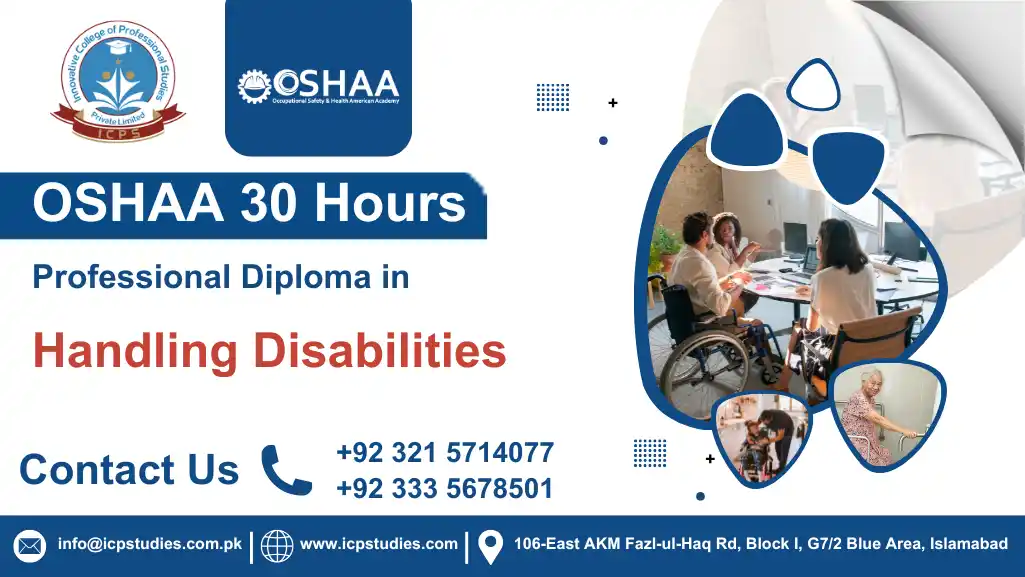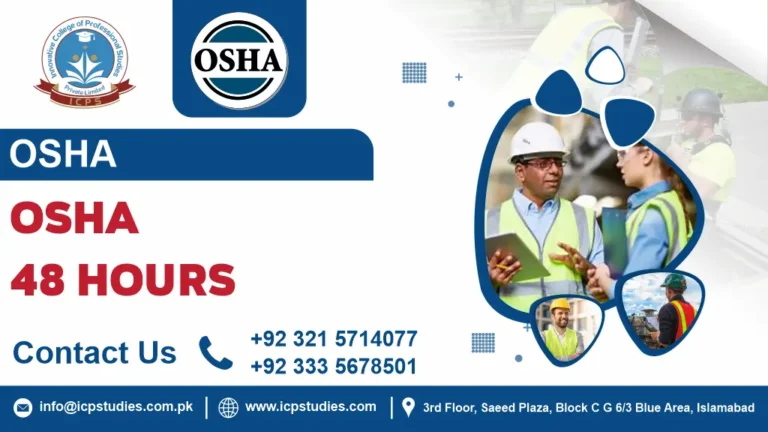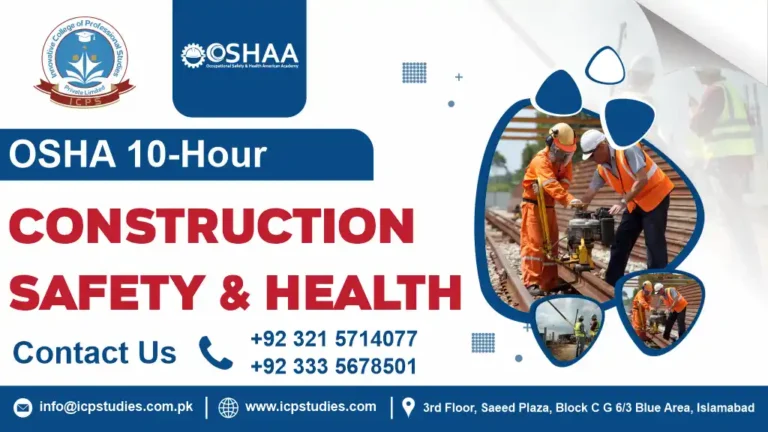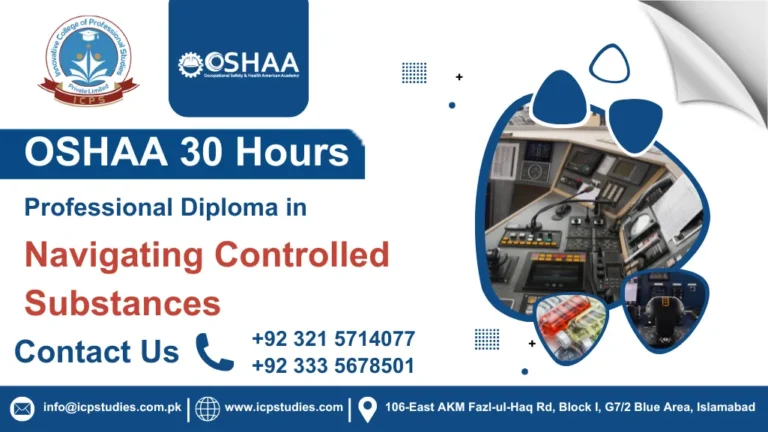The OSHAA 30-Hours Professional Diploma in Handling Disabilities is a comprehensive training programme designed to equip professionals with the knowledge and practical skills required to support individuals with physical, intellectual, developmental, and sensory disabilities. This qualification is aimed at enhancing awareness, promoting inclusive care practices, and ensuring appropriate assistance across various support environments. This structured and practical approach supports learners in applying best practices in education, healthcare, social work, and community-based support services. This diploma is ideal for healthcare workers, teachers, special education professionals, social workers, community support workers, and individuals aiming to work with people with disabilities.
This OSHAA 30-Hours Professional Diploma in Handling Disabilities course provides in-depth insight into the nature of different disabilities and the challenges faced by individuals in their daily lives. The curriculum covers disability rights, inclusive communication, adaptive strategies, behaviour management, mobility assistance, and safeguarding practices. Participants will also explore legal and ethical responsibilities within care settings, preparing them to offer compassionate and professional support. Throughout the 30 hours of study, learners will engage with real-life scenarios and case-based learning, enabling them to develop a strong understanding of the physical, emotional, and psychological aspects of disability care.
The OSHAA 30-Hours Professional Diploma in Handling Disabilities offers a flexible, accessible, and industry-relevant curriculum tailored for today’s professional demands. With an emphasis on real-world application, this programme provides learners with practical competencies, legal knowledge, and compassionate approaches essential for working in inclusive care environments. Upon successful completion of the diploma, learners can pursue advanced certifications in special needs education, disability management, or health and social care. It may also lead to opportunities in leadership roles within disability support services or progression towards degree-level qualifications in social work, occupational therapy, or community health.
All About OSHAA 30-Hours Professional Diploma in Handling Disabilities
Course Overview
The OSHAA 30-Hours Professional Diploma in Handling Disabilities is a specialised training programme designed to enhance professional competence in supporting individuals with diverse disabilities. This course provides a structured framework for understanding physical, intellectual, sensory, and developmental disabilities, equipping learners with the skills necessary to deliver inclusive and person-centred care in various settings.
The OSHAA 30-Hours Professional Diploma in Handling Disabilities focuses on practical knowledge, ethical responsibilities, and the application of disability legislation. Learners will develop expertise in communication strategies, mobility assistance, behaviour management, and safeguarding practices, ensuring a well-rounded approach to disability support.
Tailored for healthcare professionals, educators, social workers, and caregivers, this OSHAA 30-Hours Professional Diploma in Handling Disabilities prepares individuals to respond confidently and compassionately to the complex needs of disabled persons. With its blend of theory and applied learning, the qualification ensures that participants can promote dignity, independence, and equal access for all individuals they support.
By completing this OSHAA 30-Hours Professional Diploma in Handling Disabilities, learners not only enhance their professional profile but also contribute meaningfully to creating inclusive communities. The course also serves as a solid foundation for further studies or specialised roles in disability care and support services.
Study Units
- Introduction to Disabilities
- Types of Disabilities: Physical, Learning, and Sensory
- Mental Health and Disability
- Legislation and Ethical Considerations in Disability Care
- Supporting Individuals with Physical Disabilities
- Supporting Individuals with Learning Disabilities
- Sensory Disabilities: Understanding and Support Strategies
- Communication Techniques for Supporting People with Disabilities
To enrol in the OSHAA 30-Hours Professional Diploma in Handling Disabilities, applicants must meet the following criteria:
- Minimum Age: Candidates must be at least 18 years old at the time of registration.
- Educational Background: A minimum of secondary school education or its equivalent is required.
- Work Experience: No prior work experience is mandatory; however, a background in healthcare, education, or social support services is advantageous.
- Language Proficiency: Proficiency in English, both written and verbal, is essential to comprehend course materials and complete assignments effectively.
This course is designed for individuals who are committed to supporting and empowering people with disabilities across various professional settings. It is ideal for:
- Healthcare assistants, nurses, and support workers involved in patient care
- Special education teachers and classroom aides working with students with disabilities
- Social workers, counsellors, and community support staff
- Caregivers and family members providing personal or home-based disability support
- Volunteers and individuals seeking to enter the disability care sector
- Professionals aiming to enhance their knowledge of inclusive practices and disability legislation
The programme caters to both beginners and experienced individuals who wish to formalise their skills or broaden their understanding of disability care through structured, practical learning.
Learning Outcomes
Introduction to Disabilities
- Understand the definition and scope of disability in various contexts
- Recognise the impact of disabilities on individuals, families, and society
- Identify common misconceptions and promote inclusive attitudes
Types of Disabilities: Physical, Learning, and Sensory
- Distinguish between different categories of disabilities
- Understand the specific needs and challenges associated with each type
- Apply appropriate support techniques for each disability category
Mental Health and Disability
- Explore the relationship between mental health and disability
- Recognise signs of mental health conditions in individuals with disabilities
- Implement basic support approaches and referral processes
Legislation and Ethical Considerations in Disability Care
- Gain knowledge of relevant disability rights and legal frameworks
- Understand ethical responsibilities in providing care and support
- Ensure compliance with safeguarding and anti-discrimination policies
Supporting Individuals with Physical Disabilities
- Learn techniques for assisting with mobility, hygiene, and daily tasks
- Understand the use of adaptive tools and physical support strategies
- Promote independence and dignity in physical disability care
Supporting Individuals with Learning Disabilities
- Recognise characteristics of various learning disabilities
- Apply educational and behavioural strategies to support learning
- Create a supportive and enabling learning environment
Sensory Disabilities: Understanding and Support Strategies
- Understand the effects of visual, hearing, and dual sensory impairments
- Apply appropriate support and communication methods
- Identify assistive technologies and environmental adjustments
Communication Techniques for Supporting People with Disabilities
- Develop effective verbal and non-verbal communication skills
- Use inclusive communication tools and aids
- Adapt communication to meet the individual needs of service users
FAQs OSHAA 30-Hours Professional Diploma in Handling Disabilities







